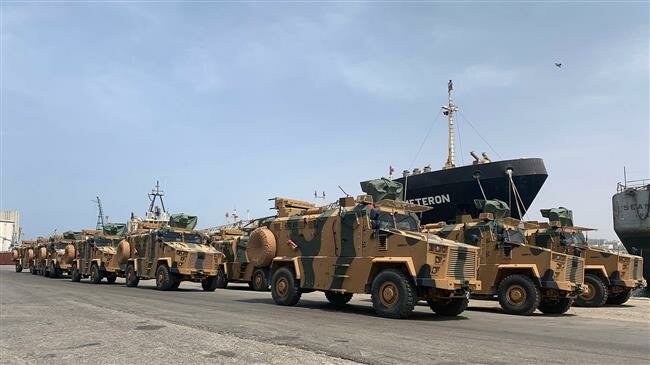Turkish arms in Libya before 'vast operation' to break siege
Sun 19 May 2019, 13:58:31

Forces loyal to the Government of National Accord (GNA) published pictures on their official Facebook page of what appeared to be Turkish-made Kirpi combat vehicles.
They are currently battling military strongman Khalifa Haftar's fighters who launched an offensive on April 4 to take the Libyan capital and topple the GNA government of Prime Minister Fayez al-Sarraj.
Haftar's forces have been held back from the city center, with fighting continuing on the outskirts of Tripoli and particularly in the southern suburbs.
In a statement, the GNA said the new weaponry had been supplied “in preparation for a vast operation to annihilate the rebels of the war criminal, the rebel Haftar.”
Haftar is supported by Saudi Arabia, Egypt and the United Arab Emirates. His forces have deployed precision-guided Blue Arrow 7 missiles known to have been provided to the UAE.
In turn, the renegade general has accused Turkey and Qatar of supplying weapons to his rivals.
A GNA spokesman had told reporters earlier in May that Turkey and other countries would be delivering military and humanitarian assistance.
The United Nations has warned that Haftar's offensive risks thrusting Libya into a full-blown civil war as foreign backers of the warring sides send arms shipments despite a UN arms embargo on the North African state.
At least 400 people have been killed in the offensive which Haftar had predicted to lead to a quick victory in the capital.
With the offensive ground to a halt on the outskirts of Tripoli, the UN has called for a ceasefire but officials say neither side is prepared for a
truce.
truce.
Sources close to Haftar have said his so-called Libyan National Army (LNA) would be willing to accept a ceasefire without withdrawing its forces from the outskirts of Tripoli, something PM Sarraj has rejected.
The United Nations has characterized Haftar’s push to seize Tripoli as an attempted coup.
Sarraj has denounced Haftar as an “aspiring military dictator”, saying his US-allied backers were turning Libya into a proxy battleground, risking a war with global implications and further mass migration to Europe.
US President Donald Trump, in a phone call with the renegade general last month, "recognized Field Marshal Haftar's significant role in fighting terrorism and securing Libya's oil resources."
The disclosure of the call prompted thousands of people in Tripoli to hold a protest against the United States and its meddling in their country.
Some European countries, such as France and Italy, have also supported Haftar. Earlier this month, the general met Italian Prime Minister Giuseppe Conte and was expected to meet French President Emmanuel Macron.
The LNA has almost two-thirds of the country and all of its oilfields under control, and some observers see the West's urge to court Haftar driven by their thirst for Libya's oil.
Libya has been the scene of fighting between rival groups since the ouster of long-time dictator Muammar Gaddafi in 2011 after a popular revolt and a Western military intervention.
His ouster created a huge power vacuum, leading to chaos and the emergence of numerous militant outfits, including the Daesh terrorist group.
No Comments For This Post, Be first to write a Comment.
Most viewed from International
Most viewed from World
AIMIM News
Latest Urdu News
Most Viewed
May 26, 2020
Do you think Canada-India relations will improve under New PM Mark Carney?
Latest Videos View All
Like Us
Home
About Us
Advertise With Us
All Polls
Epaper Archives
Privacy Policy
Contact Us
Download Etemaad App
© 2025 Etemaad Daily News, All Rights Reserved.

.jpg)
.jpg)
.jpg)






.jpg)


.jpg)
.jpg)
.jpg)
.jpg)
.jpg)
.jpg)
.jpg)
.jpg)
.jpg)
.jpg)
.jpg)
.jpg)

















